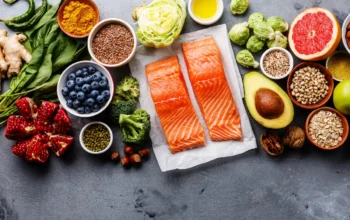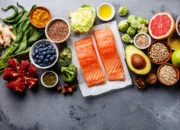Because of its high nutritional value, eggs are frequently referred to as “nature’s multivitamin.”
They also contain potent brain nutrients and special antioxidants, both of which many people lack.

Here are six explanations for why eggs rank among the world’s healthiest foods.
1. One of the Healthiest Foods on Earth Is Whole Eggs
An incredible variety of nutrients can be found in one whole egg.
It contains enough nutrients, in fact, to grow an entire newborn chicken from a single fertilized cell.
Rich in vitamins, minerals, high-quality protein, healthy fats, and additional, lesser-known components, eggs are a great source of nutrition.
One sizable egg has:
- Cobalamin, or vitamin B12: 9% of the RDA
- RDA for vitamin B2 (riboflavin) is 15%.
- 6% of the RDA is vitamin A.
- Pantothenic acid, vitamin B5, makes up 7% of the RDA.
- RDA for selenium is 22%.
- In addition, eggs provide trace levels of nearly all the vitamins and minerals that the body needs, such as calcium, iron, potassium, zinc, manganese, vitamin E, folate, and many more.
- Six grams of high-quality protein, five grams of fat, and trace amounts of carbohydrates make up the 77 calories in a large egg.
It’s critical to understand that the yolk holds nearly all of the nutrients, whereas the white solely includes protein.
2. Eggs Do Not Increase Your Risk of Heart Disease; Instead, They Help Your Cholesterol Profile
The primary cause of the public’s caution over eggs is their high cholesterol content.
212 mg of cholesterol may be found in one big egg, which is a lot more than most other foods.
Nonetheless, there is little impact of dietary cholesterol sources on blood cholesterol levels.
Actually, cholesterol is produced daily by your liver. How much you eat determines how much is created.
Your liver creates less cholesterol if you consume a lot of it through diet. Your liver creates more cholesterol if you don’t eat it.
The truth is that eggs really do enhance your cholesterol profile, according to numerous research.
They tend to alter LDL (the “bad”) cholesterol to a big subtype that is less strongly related with an elevated risk of heart disease and boost HDL (the “good”) cholesterol.
Numerous research that looked at the relationship between eating eggs and heart disease risk revealed none.
Conversely, there is evidence that eggs provide health benefits.
According to one study, eating three whole eggs a day improved HDL, decreased insulin resistance, and increased LDL particle size in individuals with metabolic syndrome.
Nonetheless, some research indicates that diabetics have a higher risk of heart disease. Further investigation is necessary, and it is unlikely that this holds true for low-carb diets, which can frequently reverse type 2 diabetes.
3. Choline, a Vital Nutrient for the Brain, Is Packed Into Eggs
A lesser-known vitamin that is frequently included in the B-complex vitamin group is choline.
For human health, choline is a necessary nutrient that the body uses for a number of functions.
It is an essential component of cell membranes and is needed for the synthesis of the neurotransmitter acetylcholine.
Heart problems, neurological conditions, and liver ailments have all been linked to inadequate choline consumption.
This nutrient might be particularly crucial for expectant mothers. Research indicates that a low consumption of choline can increase the chance of neural tube abnormalities and cause the kid to have reduced cognitive function.
A lot of folks don’t get enough calcium. For instance, a research conducted on Canadian pregnant women revealed that just 23% of them consumed enough choline.
Beef liver and egg yolks are the best dietary sources of choline. A large egg has 113 mg of choline in it.
4. High-quality proteins with the ideal amino acid profile can be found in eggs.
The primary constituents of the body, proteins have structural and functional roles.
They are made up of amino acids that have been folded into intricate shapes after being connected together like beads on a string.
Your body utilizes roughly twenty-one amino acids to make proteins.
Nine of these must come from the diet because the body is unable to generate them. They are referred to as necessary amino acids.
The proportions of these vital amino acids in a protein supply define its quality. A high-quality source of protein is one that has each of them in the proper proportions.
One of the healthiest foods to include in your diet is eggs. As a matter of fact, eggs receive a perfect score of 100 when evaluating biological value, which is a measure of protein quality.
5. Eggs Are Packed With Zeaxanthin and Lutein, Which Guard the Eyes
Eggs include two antioxidants that have the potential to significantly protect the eyes.
They are both found in the yolk and go by the names lutein and zeaxanthin.
In the retina, the sensitive portion of the eye, lutein and zeaxanthin tend to amass and shield the eyes from damaging sunlight.
One of the main causes of vision impairment and blindness in the elderly is cataracts and macular degeneration, which these antioxidants dramatically lower the chance of.
In one study, consuming 1.3 egg yolks daily for 4.5 weeks raised lutein and zeaxanthin levels in the blood by 28–50% and 114%–142%, respectively.
6. Eating eggs at breakfast can aid with fat loss
Eggs have a high protein and fat content but very little carbohydrate content.
They have a very high score on the satiety index, a measurement that quantifies the degree to which food promotes satiety.
Studies suggesting that eating eggs for breakfast may help with weight loss are therefore not shocking.
In one study, thirty women who were overweight or obese had bagels or eggs for breakfast. There were the same number of calories in both breakfasts.
For the remainder of the day and the following 36 hours, the ladies in the egg group consumed fewer calories and felt fuller.
When compared to consuming the same number of calories from bagels for breakfast, eating eggs resulted in a considerable reduction in weight across the course of an eight-week trial. The group of eggs:
- 65% greater body weight was lost.
- 16% more body fat was lost.
- had a BMI drop that was 61% greater.
- Has a waist circumference that was 34% lower (a excellent measure for the hazardous belly fat).










